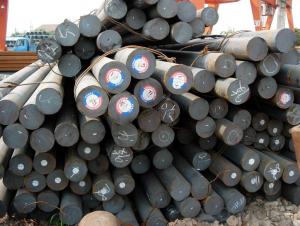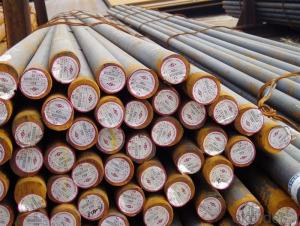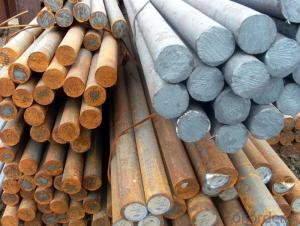42CrMo4 Alloy Steel Round Bars Hot Rolled Bars
- Loading Port:
- Tianjin
- Payment Terms:
- TT OR LC
- Min Order Qty:
- 25 m.t.
- Supply Capability:
- 50000 m.t./month
OKorder Service Pledge
OKorder Financial Service
You Might Also Like
Item specifice
42CrMo4 Alloy Steel Round Bars Hot Rolled Bars
Product Description:
1. Sizes: Diameter: 16mm-300mm; Length: 6m, 9m, 12m
2. Grade: 42CrMo, 4140,42CrMov4
3. Invoicing on theoretical weight or actual weight as customer’s request
4. Shape: Round bar, solid bar of steel with circular section
5. Technique: Hot rolled, forged, cold rolled
Specification:
Material | 42CrMo4 | Round bar | Dia(mm) | 16-600 |
Process | EAF + LF + VD + Forged + Heat Treatment (optional) | Length (mm) | Max 12000 | |
Heat treatment | Normalized / Annealed / Quenched / tempered | Flat bar | Thickness(mm) | 8-500 |
Delivery condition | Hot forged +Rough machined (black surface after Q/T)+ Turned (optional) | Width(mm) | 70-200 | |
Test | Ultrasonic test according to SEP 1921-84 D/d | Length (mm) | Max 12000 |
Chemical Composition:
C | Si | Mn | Cr | Ni | Cu |
0.38~0.45 | 0.17~0.37 | 0.50~0.80 | 0.9-1.2 | ≤0.030 | ≤0.030 |
Packing and Delivery:
Packing in bundle with steel strips and shipped by break bulk vessel or container (depend on target market and different ports)
Delivery Detail: Approx.45 days
Usage and Applications:
1. Steel round bar is used in a large number of architectural and engineering structures. Or it can be used in construction of plants for the production of steel house frames, high-voltage transmission towers, bridges, vehicles, boilers, containers, ships, etc.
2. And we can use this kind of product on the performance of the mechanical parts if the demand is not very high.
3. Some especial material steel round bar can be used for main shaft of steamer, hummer shank, with big section and supper force.
Product Show:
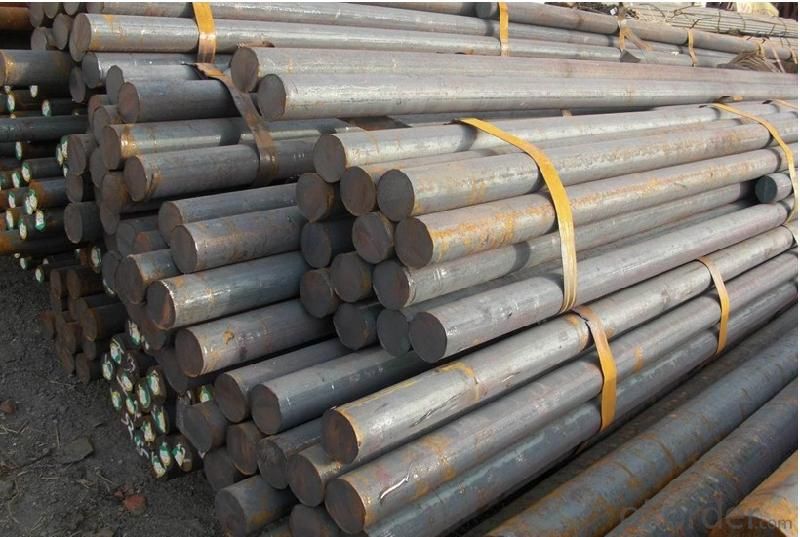
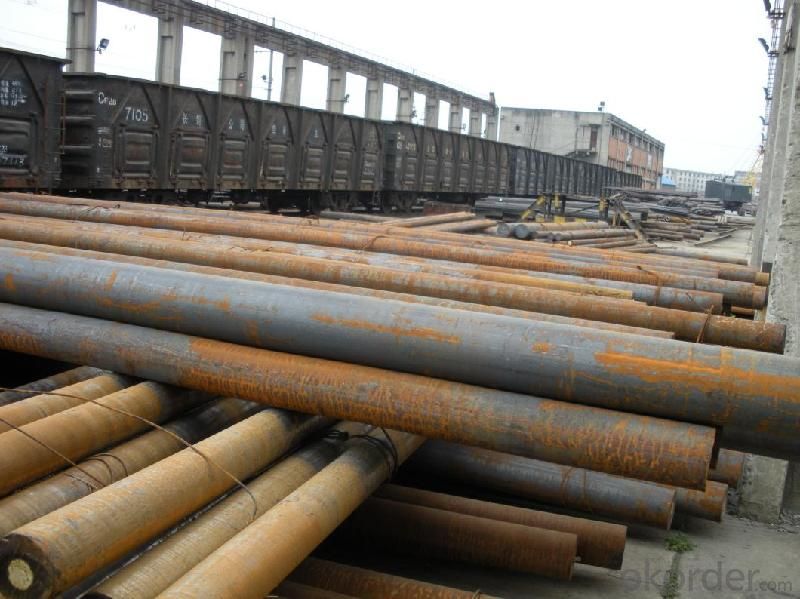
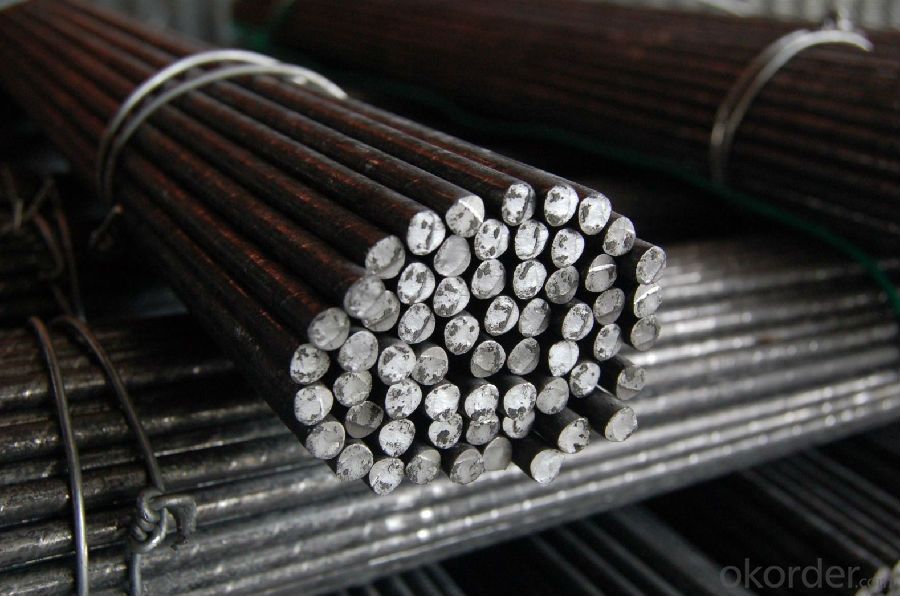
- Q:What are the future prospects for the special steel industry?
- The future prospects for the special steel industry are promising. With advancements in technology, increasing demand for high-performance materials in various sectors such as automotive, aerospace, and construction, the special steel industry is expected to witness steady growth. Additionally, the shift towards sustainable and lightweight materials in industries like renewable energy and electric vehicles presents new opportunities for the special steel industry. However, the industry may face challenges in terms of environmental regulations and competition from alternative materials. Overall, the future outlook for the special steel industry looks favorable, driven by technological advancements and evolving market demands.
- Q:How does special steel contribute to the power transmission sector?
- The power transmission sector relies heavily on special steel due to its exceptional properties and performance characteristics. Special steel is highly valued for its strength and resilience, making it an ideal material for manufacturing various components of power transmission systems. For example, transmission towers require special steel for their stability and durability, even in extreme weather conditions. Additionally, special steel's resistance to corrosion is particularly advantageous in the power transmission sector. Power transmission equipment often faces harsh environments, such as high humidity, chemical pollutants, and saltwater exposure, which can speed up corrosion. By using special steel in the manufacturing process, the risk of corrosion-related failures is significantly reduced, ensuring a reliable and uninterrupted power transmission. Furthermore, special steel's excellent electrical conductivity makes it a perfect choice for conductors and cables used in power transmission. Efficient transfer of electrical energy is crucial to minimize power losses and optimize the transmission process. Special steel conductors offer low resistance to the flow of electricity, enabling efficient power transmission over long distances. Moreover, special steel is also employed in the production of transformers and other electrical equipment used in power transmission. The magnetic properties of special steel make it an excellent material for transformer cores, facilitating efficient energy conversion and minimizing energy losses during transmission. In summary, special steel greatly contributes to the power transmission sector by providing strength, corrosion resistance, electrical conductivity, and magnetic properties. These properties ensure the reliability, efficiency, and longevity of power transmission systems, ultimately supporting the uninterrupted supply of electricity to industries, businesses, and households.
- Q:What are the different processes involved in making special steel?
- The different processes involved in making special steel include melting the raw materials in a furnace, refining the molten steel to remove impurities, adding alloying elements to achieve desired properties, casting or forming the steel into desired shapes, heat treating to enhance its strength and hardness, and finally finishing processes like machining or polishing to achieve the desired surface finish.
- Q:What are the challenges in machining special steel alloys?
- Special steel alloys pose several challenges when it comes to machining, primarily due to their unique properties and characteristics. The first major challenge is their high hardness, which is often enhanced through heat treatment to improve mechanical properties. As a result, traditional cutting tools wear out quickly or become dull, making it difficult to machine these alloys. Additionally, the high hardness increases the risk of tool breakage, leading to frequent tool changes and increased production downtime. Another challenge is the presence of abrasive elements in special steel alloys, such as chromium, tungsten, or vanadium. These elements can cause rapid tool wear and degradation, resulting in reduced cutting tool life and higher machining costs. Moreover, if not managed properly during the machining process, these abrasive elements can lead to poor surface finish and dimensional accuracy. Furthermore, special steel alloys have low thermal conductivity, making it challenging to dissipate the heat generated during machining. This can result in high temperatures at the cutting zone, causing thermal expansion and distortion of the workpiece. The heat also affects the cutting tool, reducing its efficiency and lifespan. Effective heat management is crucial to prevent workpiece deformation and maintain dimensional accuracy. Moreover, these steel alloys are prone to work hardening, meaning they become harder and more difficult to cut as the machining process progresses. Work hardening leads to increased cutting forces, tool wear, and reduced surface finish. To overcome this challenge, machining parameters such as cutting speed, feed rate, and depth of cut must be carefully optimized to avoid excessive work hardening. In conclusion, machining special steel alloys involves overcoming challenges such as high hardness, abrasive elements, low thermal conductivity, and work hardening. To address these challenges effectively, manufacturers need to use specialized cutting tools, efficient cooling and lubrication systems, optimize machining parameters, and carefully select machining strategies. By doing so, accurate and efficient machining of special steel alloys can be achieved.
- Q:What grade of iron powder should be used for processing special steel? Are there any other elements on the request? How much are they?
- Special steel into high quality carbon steel, alloy steel, high alloy steel (alloy element is greater than 10%) three categories, including alloy steel and high alloy steel special steel production accounted for 70%.
- Q:What are the challenges faced in the manufacturing process of special steel?
- There are several challenges faced in the manufacturing process of special steel. Firstly, the raw materials used in special steel production, such as alloying elements, need to be carefully selected and sourced to ensure high quality and desired properties. Secondly, the melting and casting process requires precise control of temperatures and cooling rates to prevent defects and achieve uniformity. Thirdly, achieving the desired composition and microstructure through heat treatment can be complex and time-consuming. Additionally, maintaining consistent quality throughout the entire production process can be a challenge, as any variation in parameters can result in variations in the final product. Finally, ensuring compliance with stringent industry standards and regulations adds another layer of complexity to the manufacturing process of special steel.
- Q:What are the different methods of surface honing for special steel?
- Surface honing for special steel can be achieved through various methods, each with its own benefits and uses. Among the commonly employed techniques are: 1. Manual Honing: This approach entails the utilization of handheld honing tools, such as stones, sticks, or abrasive pads, to manually remove material from the steel's surface. Manual honing permits meticulous control and is often suitable for smaller or intricate components. 2. Machine Honing: Machine honing involves the use of specialized honing machines that automate the honing process. These machines typically feature rotating honing stones or abrasive belts, which eliminate material from the steel's surface. Machine honing is favored for larger or complex parts, as it ensures consistent and high-quality outcomes. 3. Diamond Honing: Diamond honing relies on diamond abrasives to eradicate material from the special steel's surface. Given that diamond is one of the hardest substances known, it is exceptionally effective for honing steel. This method is commonly employed in high-precision applications or instances where an exceedingly smooth surface finish is required. 4. Superfinishing: Superfinishing is a specialized honing process that achieves extremely fine surface finishes on special steel. It combines honing stones and abrasive pastes to remove minuscule amounts of material from the surface. Superfinishing is typically utilized in critical applications where surface roughness and dimensional accuracy are of utmost importance. 5. Lapping: Lapping is a honing method that employs a combination of abrasive particles and a rotating or vibrating tool to eliminate material from the steel's surface. It is particularly suitable for parts necessitating a very flat or parallel surface, such as bearings or sealing surfaces. 6. Electrochemical Honing: Electrochemical honing is a specialized process that employs an electric current to remove material from the special steel's surface. It is often employed for intricate or hard-to-reach surfaces, as it effectively eliminates material from areas inaccessible to other honing methods. To sum up, the various methods of surface honing for special steel encompass manual honing, machine honing, diamond honing, superfinishing, lapping, and electrochemical honing. Each method offers distinct advantages and applications, enabling precise control and the attainment of desired surface finishes and dimensional accuracy for special steel components.
- Q:How does special steel contribute to the pharmaceutical industry?
- Special steel plays a crucial role in the pharmaceutical industry by offering exceptional strength, corrosion resistance, and durability. It is used in the manufacturing of various equipment and components such as storage tanks, reactors, piping systems, and precision instruments. The unique properties of special steel ensure the integrity and purity of pharmaceutical products, prevent contamination, and enable efficient and safe production processes.
- Q:Can special steel be used in the defense sector?
- Yes, special steel can be used in the defense sector. Special steel refers to alloys or compositions that are specifically designed to possess certain properties, such as high strength, hardness, resistance to corrosion, or heat resistance. These properties make special steel suitable for various defense applications, including the construction of armored vehicles, naval vessels, aircraft, and weaponry. In the defense sector, special steel can be used to manufacture components and structures that require exceptional strength and durability. For example, it can be used in the production of armor plates for tanks and armored vehicles, which need to withstand high impact and ballistic threats. Special steel can also be utilized in the construction of naval vessels, where it provides resistance to corrosion and enhances the overall structural integrity. Furthermore, special steel is crucial in the defense industry for the manufacturing of aircraft parts and weaponry. Aircraft components, such as landing gear, engine parts, and structural elements, require high-strength materials to ensure safe and reliable operation. Special steel alloys can provide the necessary strength and resistance to extreme conditions, such as high temperatures and pressures, making them ideal for these applications. Moreover, special steel can be used in the production of various types of weapons, including firearms and blades. Its excellent strength and hardness properties make it suitable for manufacturing gun barrels, bulletproof vests, and knives used by military personnel. In summary, special steel is highly valued in the defense sector due to its exceptional properties, including strength, hardness, corrosion resistance, and heat resistance. It finds extensive applications in the construction of armored vehicles, naval vessels, aircraft, and weaponry, ensuring the safety, durability, and effectiveness of military equipment.
- Q:What are the main applications of special steel?
- Special steel is used in a wide range of industries and applications due to its exceptional properties. Some of the main applications of special steel include manufacturing of tools and machinery, construction of buildings and infrastructure, automotive and aerospace industries, energy and power generation, and medical equipment. Its high strength, corrosion resistance, heat resistance, and durability make it an ideal choice for these demanding applications.
1. Manufacturer Overview |
|
|---|---|
| Location | |
| Year Established | |
| Annual Output Value | |
| Main Markets | |
| Company Certifications | |
2. Manufacturer Certificates |
|
|---|---|
| a) Certification Name | |
| Range | |
| Reference | |
| Validity Period | |
3. Manufacturer Capability |
|
|---|---|
| a)Trade Capacity | |
| Nearest Port | |
| Export Percentage | |
| No.of Employees in Trade Department | |
| Language Spoken: | |
| b)Factory Information | |
| Factory Size: | |
| No. of Production Lines | |
| Contract Manufacturing | |
| Product Price Range | |
Send your message to us
42CrMo4 Alloy Steel Round Bars Hot Rolled Bars
- Loading Port:
- Tianjin
- Payment Terms:
- TT OR LC
- Min Order Qty:
- 25 m.t.
- Supply Capability:
- 50000 m.t./month
OKorder Service Pledge
OKorder Financial Service
Similar products
New products
Hot products
Related keywords
